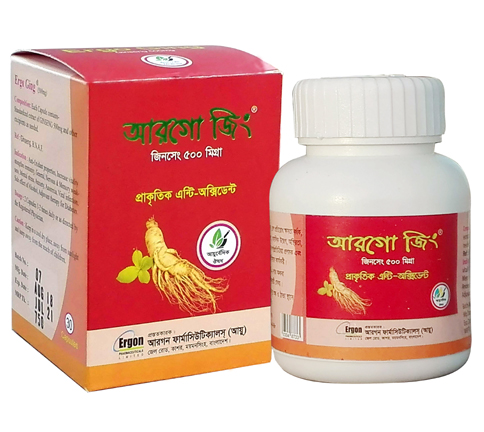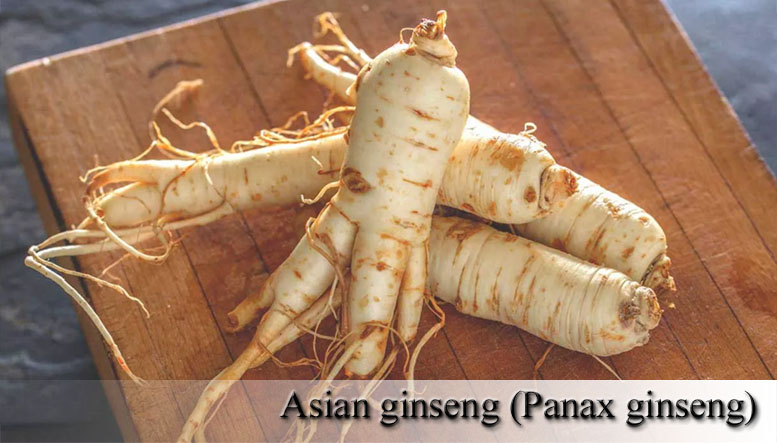Health Benefits of Panax Ginseng :
Let’s take a more in-depth look at the health benefits of
panax ginseng:
1. Potent Antioxidant That May Reduce Inflammation-
Ginseng has beneficial antioxidant and anti-inflammatory properties
(read more).
Some test-tube studies have shown that ginseng extracts and ginsenoside compounds could inhibit inflammation and increase antioxidant capacity in cells
(read more).
For example, one test-tube study found that Korean red ginseng extract reduced inflammation and improved antioxidant activity is skin cells from people with eczema
(read more).
The results are promising in humans, as well.
One study investigated the effects of having 18 young male athletes take 2 grams of Korean red ginseng extract three times per day for seven days.
The men then had levels of certain inflammatory markers tested after performing an exercise test. These levels were significantly lower than in the placebo group, lasting for up to 72 hours after testing
(read more).
However, it should be noted that the placebo group got a different medicinal herb, so these results should be taken with a grain of salt and more studies are needed.
Lastly, a larger study followed 71 postmenopausal women who took 3 grams of red ginseng or a placebo daily for 12 weeks. Antioxidant activity and oxidative stress markers were then measured.
Researchers concluded that red ginseng may help reduce oxidative stress by increasing antioxidant enzyme activities
(read more).
SUMMARY : Ginseng has been shown to help reduce inflammatory markers and help protect against oxidative stress.
2. May Benefit Brain Function-
Ginseng could help improve brain functions like memory, behavior and mood
(read more).
Some test-tube and animal studies show that components in ginseng, like ginsenosides and compound K, could protect the brain against damage caused by free radicals
(read more).
One study followed 30 healthy people who consumed 200 mg of Panax ginseng daily for four weeks. At the end of the study, they showed improvement in mental health, social functioning and mood.
However, these benefits stopped being significant after 8 weeks, suggesting that ginseng effects might decrease with extended use
(read more).
Another study examined how single doses of either 200 or 400 mg of Panax ginseng affected mental performance, mental fatigue and blood sugar levels in 30 healthy adults before and after a 10-minute mental test.
The 200-mg dose, as opposed to the 400-mg dose, was more effective at improving mental performance and fatigue during the test
(read more).
It is possible that ginseng assisted the uptake of blood sugar by cells, which could have enhanced performance and reduced mental fatigue. Yet it is not clear why the lower dose was more effective than the higher one.
A third study found that taking 400 mg of Panax ginseng daily for eight days improved calmness and math skills
(read more).
What’s more, other studies found positive effects on brain function and behavior in people with Alzheimer's disease
(read more).
SUMMARY : Ginseng has been shown to benefit mental functions, feelings of calmness and mood in both healthy people and those with Alzheimer's disease.
3. Could Improve Erectile Dysfunction-
Research has shown that ginseng may be a useful alternative for the treatment of erectile dysfunction (ED) in men
(read more).
It seems that compounds in it may protect against oxidative stress in blood vessels and tissues in the penis and help restore normal function
(read more).
Additionally, studies have shown that ginseng may promote the production of nitric oxide, a compound that improves muscle relaxation in the penis and increases blood circulation
(read more).
One study found that men treated with Korean red ginseng had a 60% improvement in ED symptoms, compared to 30% improvement produced by a medication used to treat ED
(read more).
Moreover, another study showed that 86 men with ED had significant improvements in erectile function and overall satisfaction after taking 1,000 mg of aged ginseng extract for 8 weeks
(read more).
SUMMARY : Ginseng may improve symptoms of erectile dysfunction by decreasing oxidative stress in tissues and enhancing blood flow in penile muscles.
4. May Boost the Immune System-
Ginseng may strengthen the immune system
(read more).
Some studies exploring its effects on the immune system have focused on cancer patients undergoing surgery or chemotherapy treatment.
One study followed 39 people who were recovering from surgery for stomach cancer, treating them with 5,400 mg of ginseng daily for two years.
Interestingly, these people had significant improvements in immune functions and a lower recurrence of symptoms
(read more).
Another study examined the effect of red ginseng extract on immune system markers in people with advanced stomach cancer undergoing post-surgery chemotherapy.
After three months, those taking red ginseng extract had better immune system markers than those in the control or placebo group
(read more).
Furthermore, a study suggested that people who take ginseng could have up to a 35% higher chance of living disease-free for five years after curative surgery and up to a 38% higher survival rate compared to those not taking it
(read more).
It seems that ginseng extract could enhance the effect of vaccinations against diseases like influenza, as well
(read more).
Even though these studies show improvements in immune system markers in people with cancer, more research is needed to demonstrate the efficacy of ginseng in boosting resistance to infections in healthy people
(read more).
SUMMARY : Ginseng may strengthen the immune system in people with cancer and even enhance the effects of certain vaccinations.
5. May Have Potential Benefits Against Cancer-
Ginseng may be helpful in reducing the risk of certain cancers
(read more).
Ginsenosides in this herb have been shown to help reduce inflammation and provide antioxidant protection
(read more).
The cell cycle is the process by which cells normally grow and divide. Ginsenosides could benefit this cycle by preventing abnormal cell production and growth.
A review of several studies concluded that people who take ginseng may have a a 16% lower risk of developing cancer
(read more).
Moreover, an observational study suggested that people taking ginseng could be less likely to develop certain types of cancer, such as lip, mouth, esophagus, stomach, colon, liver and lung cancer, than those who do not take it
(read more).
Ginseng may also help improve the health of patients undergoing chemotherapy, reduce side effects and enhance the effect of some treatment drugs .
While studies on the role of ginseng in cancer prevention show some benefits, they remain inconclusive.
SUMMARY : Ginsenosides in ginseng seem to regulate inflammation, provide antioxidant protection and maintain the health of cells, which could help decrease the risk of certain kinds of cancer. Nevertheless, more research is needed.
6. May Fight Tiredness and Increase Energy Levels-
Ginseng has been shown to help fight fatigue and promote energy.
Various animal studies have linked some components in ginseng, like polysaccharides and oligopeptides, with lower oxidative stress and higher energy production in cells, which could help fight fatigue
(read more).
One four-week study explored the effects of giving 1 or 2 grams of Panax ginseng or a placebo to 90 people with chronic fatigue
(read more).
Those given Panax ginseng experienced less physical and mental fatigue, as well as reductions in oxidative stress, than those taking the placebo
(read more).
Another study gave 364 cancer survivors experiencing fatigue 2,000 mg of American ginseng or a placebo. After eight weeks, those in the ginseng group had significantly lower fatigue levels than those in the placebo group
(read more).
Furthermore, a review of over 155 studies suggested that ginseng supplements may not only help reduce fatigue but also enhance physical activity
(read more).
SUMMARY : Ginseng may help fight fatigue and enhance physical activity by lowering oxidative damage and increasing energy production in cells.
7. Could Lower Blood Sugar-
Ginseng seems to be beneficial in the control of blood glucose in people both with and without diabetes
(read more).
American and Asian ginseng have been shown to improve pancreatic cell function, boost insulin production and enhance the uptake of blood sugar in tissues
(read more).
Moreover, studies show that ginseng extracts help by providing antioxidant protection that reduce free radicals in the cells of those with diabetes
(read more).
One study assessed the effects of 6 grams of Korean red ginseng, along with the usual anti-diabetic medication or diet, in 19 people with type 2 diabetes.
Interestingly, they were able to maintain good blood sugar control throughout the 12-week study. They also had an 11% decrease in blood sugar levels, a 38% decrease in fasting insulin and a 33% increase in insulin sensitivity
(read more).
Another study showed that American ginseng helped improve blood sugar levels in 10 healthy people after they performed a sugary drink test
(read more).
It seems that fermented red ginseng could be even more effective at blood sugar control. Fermented ginseng is produced with the help of live bacteria that transform the ginsenosides into a more easily absorbed and potent form
(read more).
In fact, a study demonstrated that taking 2.7 grams of fermented red ginseng daily was effective at lowering blood sugar and increasing insulin levels after a test meal, compared to a placebo
(read more).
SUMMARY : Ginseng, particularly fermented red ginseng, may help increase insulin production, enhance blood sugar uptake in cells and provide antioxidant protection.




